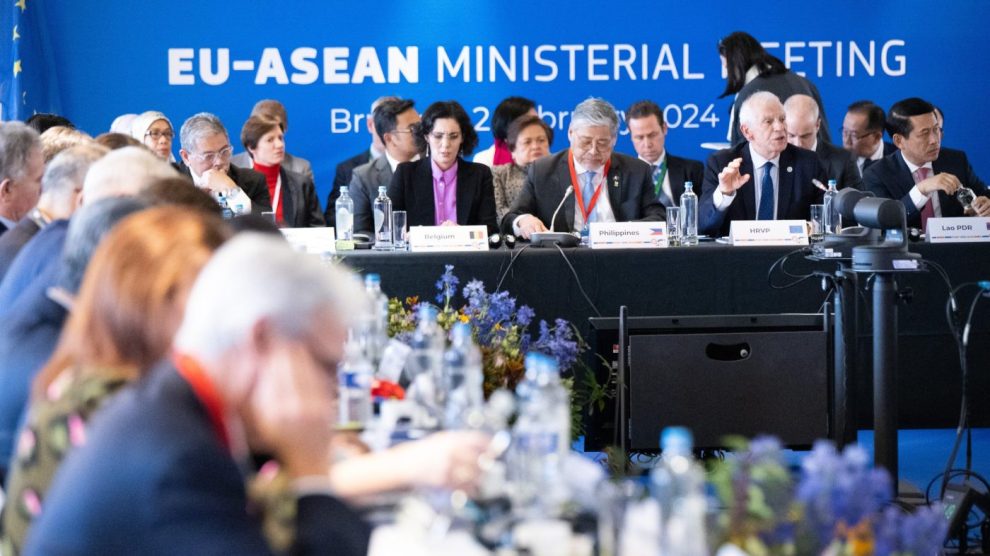The EU looks to the Indo-Pacific. Two parallel, high-level meetings went on in Brussels on Friday. Both were between European Union representatives and the foreign ministers from key Asian States. Both underscored how the EU intends to bolster its projection in that vital region, seeking deeper cooperation while affirming its autonomy (mainly via the absence of two major regional interlocutors, i.e. the United States and China).
- This double meeting format – which European diplomats call “back-to-back” – is conducive to all of that. EU countries depict themselves as a third partner, somewhat removed from the complex context of great power rivalry that characterises the Indo-Pacific space.
All the ministers… One, initiated by Paris, entailed EU foreign ministers (in an informal format) meeting their counterparts from over 50 Indo-Pacific countries. Chaired by the EU’s High Representative for Foreign Affairs, Josep Borrell, the encounter is based on working tables on topics of mutual interest, ranging from climate change and environmental degradation (an “existential threats for both” according to an EU note) to the digital economy and its potential to foster innovation, development and growth in both regions.
… and ASEAN. The other saw them facing representatives from the Association of Southeast Asian Nations, a bilateral dialogue elevated to a “strategic partnership” in 2020. It also focussed on similar themes, albeit with greater concreteness – it was, after all, the 24th such meeting. The Philippines’ Foreign Minister Enrique Manalo chaired the meeting alongside Mr Borrell, as Manila is responsible within ASEAN for dialogue with the EU.
- Participants took stock of the implementation of last year’s decisions and charted the next steps in the evolution of relations. They discussed how to strengthen the partnership in crucial areas, such as trade and climate change, and possible developments in regional and international security.
Words (and deeds) from Rome. “ASEAN is an essential interlocutor for the growth and stability of the Indo-Pacific. Italy will continue to invest in relations with this regional organisation, of which we are a Development Partner,” remarked Italian Foreign Minister Antonio Tajani, recalling that the “stability, prosperity and security of the Indo-Pacific, a crucial region for world balances and the safeguarding of freedom of trade and navigation, will be qualifying elements of the Italian G-7 Presidency.”
- Rome plans to invite ASEAN as an association to the G-7 Summit, possibly some of its members (Vietnam and Indonesia are mentioned), although no diplomatic letters have yet been issued.
- There will also be other Indo-Pacific nations, such as Australia and New Zealand, possibly India and South Korea, the Cook Islands (which chair the Pacific Island Forum, of which Italy is a “dialogue partner”) and the Comoros Islands (which currently chair the African Union, although they should be replaced by rotation later this year).
Always good to talk. A few hours before the opening of the two summits, Mr Borrel asserted – through an op-ed published by Singapore’s Business Times – that in a world marked by geopolitical competition and rivalry between the great powers, such summits “indicate a strong shared interest” on the part of the EU and the Indo-Pacific countries to foster closer cooperation, enhance their security, prosperity and resilience.
- The EU works well with ASEAN due to its defined dimension. Both blocs are also central trading blocs for the global economy, and they are particularly exposed to trends arising from areas like the Middle East and Africa.
- There’s an increasing general awareness that the fates of Europe and the Indo-Pacific (including the ASEAN space) are increasingly interconnected via the Indo-Mediterranean route connecting West and East.
Image: Bogdan Hoyaux, European Union, 2024




